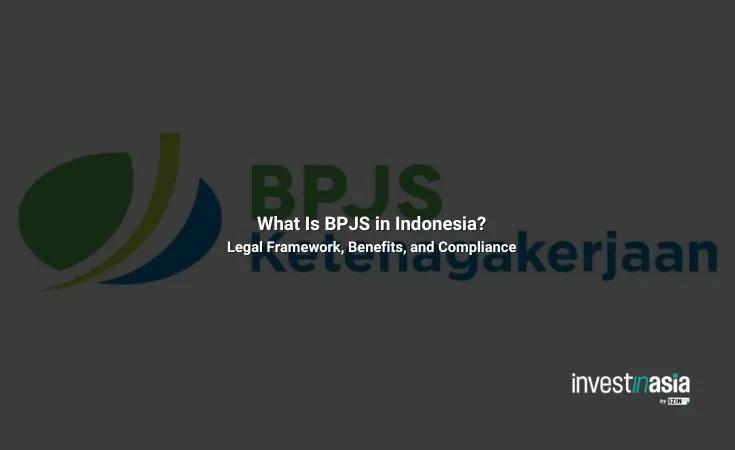All companies in Indonesia are legally required to register their employees with BPJS Ketenagakerjaan (employment social security) and BPJS Kesehatan (healthcare). Non-compliance can result in fines, difficulties with business licensing, and legal risks. For both employers and employees, BPJS ensures access to essential healthcare, workplace protection, and long-term benefits.
What Is BPJS in Indonesia?


BPJS (Badan Penyelenggara Jaminan Sosial) is Indonesia’s mandatory social security system. It covers both healthcare and employment-related risks, ensuring protection for all residents and workers, including foreign employees. Every employer must register employees with BPJS. Non-compliance may result in penalties, business restrictions, or even license revocation.
Legal Foundation of BPJS
The system is grounded in Law No. 40/2004 (National Social Security System) and Law No. 24/2011 (BPJS Law). Supporting regulations—such as Government Regulation No. 86/2013 and No. 44/2015—provide enforcement mechanisms. The program operates under principles of equity, social justice, and universality.
Also read: Indonesia Labour Law & Employment Regulations: Complete Guide
Relief for Certain Business Sizes
There are concessions for micro and small enterprises (UMKM) in certain respects. For example, Government Regulation No. 37 of 2021 provides some relief or exemptions for micro-business employers in fulfilling certain workers’ rights under BPJS, meaning they might have some reduced obligations.
Additionally, some micro, small, and special KUR (People’s Business Credit) recipient enterprises may enjoy relaxation exemptions such as exemption from additional collateral requirements or some other procedural easements, although these are more related to financing support rather than BPJS direct exemption.
Also read: Exploring Indonesia’s Incentives for Labor-Intensive Industries
Types of BPJS
There are two types of BPJS in Indonesia, namely:
BPJS Kesehatan (Healthcare Insurance)
BPJS Kesehatan provides nationwide healthcare under the JKN program. Coverage includes:
- Primary and specialist care
- Hospitalization and surgery
- Maternity services
- Prescription drugs
- Preventive care such as immunization
Participants choose service classes (Class I–III) with different accommodation standards. Premiums vary based on class and dependents.
The following is a detailed table for BPJS Kesehatan classes:
| Class | Monthly Premium (Self-employed) | Employment-based Premium | Hospital Room | Upgrade Options |
| Class 1 | IDR 150,000-160,000 | 4% of salary | 2-4 patients | VIP (with extra cost) |
| Class 2 | IDR 100,000-110,000 | 3% of salary | 3-5 patients | Class 1/VIP (with extra cost) |
| Class 3 | IDR 25,000-42,000 | 2% of salary | 4-6 patients | Class 1/2 (with extra cost) |
BPJS Ketenagakerjaan (Employment Social Security)
BPJS Ketenagakerjaan protects workers against employment risks through five programs:
- JKK (Work Accident Insurance): Covers medical treatment and rehabilitation for workplace incidents.
- JKM (Death Insurance): Provides financial support for the worker’s family in case of death.
- JHT (Old Age Security): A retirement savings scheme payable as a lump sum.
- JP (Pension Security): Monthly pension benefits (not available to foreign workers).
- JKP (Unemployment Insurance): Cash benefits and retraining support for laid-off employees.
Also read: Work Culture in Indonesia: A Glimpse into the Work Ethic
Foreign Worker Requirements
Foreign employees are not exempt. Even if you already have international insurance, you must still enroll in BPJS if working in Indonesia for six months or more. Required documents include work permits, KITAS (stay permit), and proof of employment.
Also read: Working in Indonesia as a Foreigner: A Complete Guide
Employer Obligations and Compliance


Every company, including foreign-owned PT PMA, must register all employees within 30 days of hiring. Foreign workers with more than six months’ stay must also join. Contributions are calculated from salary plus allowances, with strict deadlines by the 10th of each month.
Failure to comply may lead to:
- Written warnings
- Fines of 0.1% per month on unpaid contributions
- Denial of permits and business licenses
- Criminal sanctions, including imprisonment and fines up to IDR 1 billion
BPJS Contributions from Employees and Employers
Details regarding contributions payable by employees and employers can be found in the table below.
| BPJS Type | Employer Contribution | Employee Contribution | Total Contribution | Maximum Salary Limit | Mandatory For | Foreign Worker Eligibility |
| BPJS Kesehatan (Healthcare) | 4% of salary | 1% of salary | 5% of salary | IDR 12,000,000/month | All employees | Yes (6+ months) |
| BPJS Ketenagakerjaan – JKK (Work Accident) | 0.24% – 1.74% (risk-based) | None | 0.24% – 1.74% of salary | IDR 12,000,000/month | All employees | Yes (6+ months) |
| BPJS Ketenagakerjaan – JKM (Death) | 0.3% of salary | None | 0.3% of salary | IDR 12,000,000/month | All employees | Yes (6+ months) |
| BPJS Ketenagakerjaan – JHT (Old Age) | 3.7% of salary | 2% of salary | 5.7% of salary | IDR 12,000,000/month | All employees | Yes (6+ months) |
| BPJS Ketenagakerjaan – JP (Pension) | 2% of salary | 1% of salary | 3% of salary | IDR 10,547,400/month (2025) | All employees | No |
| BPJS Ketenagakerjaan – JKP (Unemployment) | 0.22% (government funded) | None | 0.22% of salary | IDR 12,000,000/month | All employees | Yes (6+ months) |
Best Practices for Employers
Here are some tips for complying with BPJS regulations:
- Register immediately after incorporation or hiring.
- Submit accurate data for salaries and dependents.
- Pay contributions on time.
- Keep employee records updated.
- Use professional assistance to handle compliance.
Also read: Common Mistakes Businesses Must Avoid When Starting a Company in Indonesia
Why BPJS Matters for Business Stability
For investors and foreign companies, BPJS compliance is more than a legal requirement. It affects licensing, immigration permits, and overall operational legitimacy in Indonesia. With recent government enforcement, overlooking BPJS obligations can put your business at risk.
Partnering for Compliance and Expansion
If you’re a foreign investor looking to establish or expand in Indonesia, BPJS is only one of many regulatory requirements you must handle. Our team at InvestinAsia specializes in guiding foreign businesses through incorporation, licensing, and ongoing compliance—including Payroll and BPJS registration service. By working with us, you can focus on growing your operations while we manage the legal complexities.
Contact us now for a FREE consultation and get a special packages!
FAQs About BPJS in Indonesia
What is the difference between BPJS Kesehatan and BPJS Ketenagakerjaan?
BPJS Kesehatan covers healthcare services, while BPJS Ketenagakerjaan protects against employment-related risks such as accidents, death, retirement, pension, and unemployment.
Do foreign workers have to join BPJS?
Yes. Any foreign worker employed for six months or more in Indonesia must be registered with both BPJS programs.
What happens if my company does not register employees with BPJS?
You may face administrative fines, denial of business services, or even criminal penalties including license revocation.
Is BPJS better than private insurance?
BPJS ensures universal access and is mandatory. Many employers combine BPJS with private insurance for broader coverage.
How much do employers and employees contribute?
Rates vary by program. For example, JHT requires 5.7% of wages (3.7% employer, 2% employee), while JKK contributions range from 0.24%–1.74% depending on risk level.



